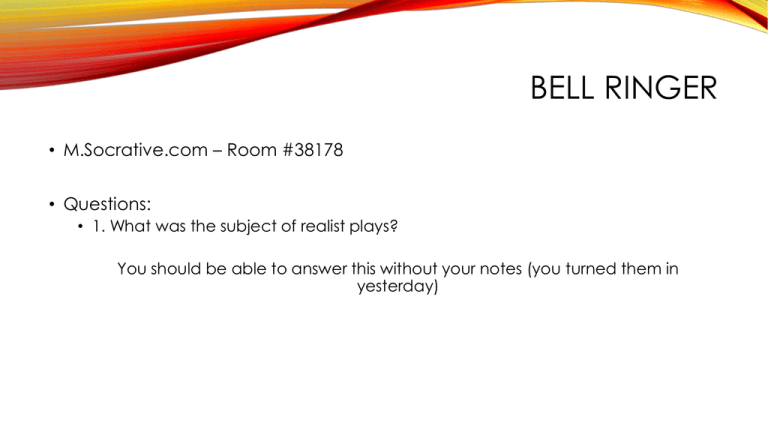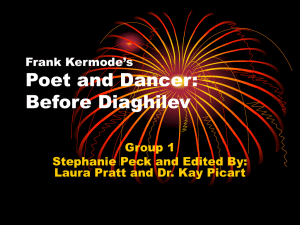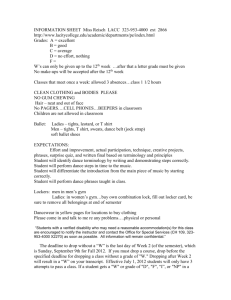File
advertisement

BELL RINGER • M.Socrative.com – Room #38178 • Questions: • 1. What was the subject of realist plays? You should be able to answer this without your notes (you turned them in yesterday) IMPRESSIONISM DANCE DANCE • Two major revolutions in dance occurred in the early 20th century • Sergei Diaghilev (DYAH-gee-lef; 1872-1929) was largely responsible for one of them • When Diaghilev arrived in St. Petersburg, Russia, in 1890 to study law, he became friends with several artists. • In 1898, his friends launched a new magazine, World of Art, and appointed him editor DANCE - DIAGHILEV • His career in artistic management shaped the ballet world of the 20th century • In producing outstanding works that employed the finest choreographers, he played a tremendous role in bringing the art of Paris and Munich to Moscow and St. Petersburg (and vice versa) DANCE - DIAGHILEV • Once he had successfully produced opera outside of Russia, he was encouraged to take Russian ballet to Paris • In 1909 he opened the first of his many Ballets russes • The dancers included the greatest dancers of Russia • Including Anna Pavlova and Vaslav Nijinsky DANCE - DIAGHILEV • Mikhail Fokine was the choreographer • He believed in the artistic unity of all production elements – costumes, settings, music, and dance • Dancing should blend harmoniously with the theme and subject of the production DANCE - NIJINSKY • Diaghilev loved Nijinsky’s dancing and decided that he should choreograph as well • In 1912, he choreographed the controversial Prelude to the Afternoon of a Faun (music by Debussy) • The choreography was rife with sexual suggestion and the obscenity of the performance caused an uproar • Rudolph Nureyev : Afternoon of a Faun' – YouTube (30 seconds) DANCE - NIJINSKY • A year later, the unveiling of Nijinsky’s choreography of Stravinsky’s Rite of Spring caused an actual riot • The controversy of Rite of Spring had to do with the music and the dancing - the choreography was definitely shocking • Joffrey Ballet 1987 Rite of Spring (3 of 3) – YouTube (beg and 4:25) • Riot at the Rite (final,part 6) – YouTube DANCE - MASSINE • Diaghilev’s new choreographer, Leonide Massine, took the company (and ballet in general) in new directions • Nijinsky’s decision to marry in 1913 caused a rift with Diaghilev and he was dismissed from the company • Diaghilev was homosexual – rumor says he had feelings for Nijinsky and thus dismissed him when he wed someone else • The ballets turned to themes emerging in the visual arts, for example cubism and eventually surrealism (we’ll talk about soon!) DANCE - MASSINE • Parade in 1917 found dancers in huge skyscraper-like cubist costumes designed by Pablo Picasso • The music, by Eric Satie, included sounds of typewriters and steamship whistles DANCE - BALANCHINE • In 1924, Diaghilev hired a new choreographer, George Balanchine • He came from St. Petersburg and choreographed 10 productions for him over the next 4 years • Two of these are still danced today – The Prodigal Son by Prokofiev, and Apollo by Stravinsky • George Balanchine's Apollo - YouTube DANCE - BALANCHINE • When Diaghilev died in 1929, his company died with him and an era ended • Ballet had been reborn as a major art form, a blending of choreography, dancing, music, and visual art – a rival to opera as a “perfect synthesis of the arts” DUNCAN & MODERN DANCE • When Diaghilev continued within balletic traditions, others did not • The most significant of the set was the remarkable and unrestrained Isadora Duncan (1878-1927) • American • By 1905, Duncan had gained notoriety for her barefoot, deeply emotional dancing DUNCAN & MODERN DANCE • Achieved her fame in Europe • Her dances were emotional interpretations of moods suggested to her by music or by nature • Her dance was personal • She danced in bare feet • This break with convention continues to this day as a basic condition of the modern dance tradition she helped to form DUNCAN & MODERN DANCE • Isadora Duncan’s Style (this will transition into Modern and Contemporary Dance) • Isadora Duncan - Maenod - YouTube • 15 minutes short




